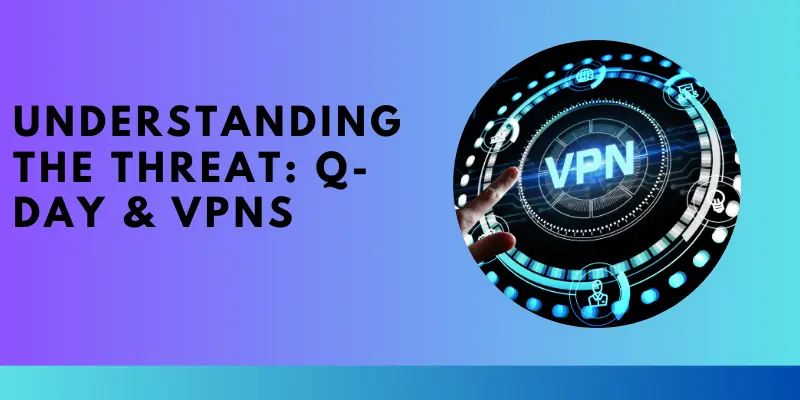Quantum Networking Effects On VPN One Day – The Shocking Truth
Published: 14 Aug 2025
The quantum networking effects on vpn is rising and the changes are starting to take place. Now, Imagine a future where your trusted VPN is useless. Not because you stopped paying for it, but because technology itself has outgrown it. Quantum networking is on the horizon a communication method so secure that today’s encryption looks like a child’s lockbox. The same technology that promises unbreakable privacy will also make current VPNs obsolete. If you think this change is far away, think again. The countdown has already started.
Understanding the Threat: Q-Day & VPNs
What is Q-Day?
Q-Day is the name experts give to the moment when quantum computers become powerful enough to break the encryption that protects most of the world’s data.

This isn’t science fiction it’s a real threat that could arrive between 2030 and 2050. The exact date is uncertain, but the clock is ticking. When Q-Day arrives, everything from personal messages to bank records could be unlocked in minutes.
Why VPNs Are Vulnerable
A VPN hides your internet activity by wrapping it in strong encryption. Right now, most VPNs use encryption systems like RSA or ECC. These are incredibly secure against normal computers but not against quantum ones. VPN has many useful impacts for us like VPN for online privacy.
Quantum computers work differently. They use qubits and quantum algorithms that can solve certain problems much faster than traditional machines. One of those problems is factoring large numbers, the core of RSA security. Once a quantum computer reaches enough scale, it could crack RSA or ECC keys in hours or even minutes, exposing all the data a VPN is supposed to protect.
The Harvester Threat Model
The danger isn’t just in the future it’s happening now. Hackers, governments, or even corporations could be intercepting and storing encrypted data today. This method is called “harvest now, decrypt later.” They collect your VPN-protected data now, knowing they can’t read it yet. But when quantum computers become powerful enough, they’ll go back, decrypt it instantly, and see everything like emails, chats, financial records, private files without you ever knowing.
Enter Quantum Networking: A Game-Changer
What is Quantum Networking?
Quantum networking is a new way of sending information using qubits the building blocks of quantum computing. Unlike normal bits, which are either 0 or 1, qubits can be both at the same time. This unique property lets quantum networks create security systems that are far stronger than anything we use today.
One of the most powerful tools in quantum networking is Quantum Key Distribution (QKD). QKD uses the laws of physics to share secret keys between two parties. If anyone tries to eavesdrop, the quantum state changes and the intrusion is immediately detected.
Key Capabilities
- Uncopyable Qubits: In quantum mechanics, you can’t perfectly copy an unknown quantum state. This means no hacker can make a duplicate of your secure key without being noticed.
- Entanglement-Based Key Exchange: Two qubits can be “entangled” so that whatever happens to one instantly affects the other even if they’re far apart. This allows for ultra-secure key sharing.
- Quantum Repeaters: These are devices that extend quantum signals over long distances without losing their security, making large-scale quantum networks possible.
Real-World Progress
This isn’t just theory, quantum networking is already being tested in the real world. Some financial institutions have run QKD-secured VPN tunnels over high-speed fiber connections, reaching speeds up to 100 gigabits per second. Research labs and tech companies are building experimental quantum networks that link cities and even connect across countries. These early successes show that a fully secure quantum internet could be closer than many think.
The Death of VPNs and Why
Inherent Weakness
VPNs are built on classical encryption – the type of math-based security we’ve used for decades. This works well against normal computers, but quantum computers are a different story. Once they become powerful enough, they’ll be able to solve the math problems that keep VPN data safe. That means the core security of a VPN can be broken, no matter how strong the password or encryption key seems today. This is one of the main effects of quantum networking effects on VPN.
Quantum Networking as a Replacement
Quantum networking doesn’t just improve encryption it changes the rules. It uses the laws of physics to protect data. For example, if someone tries to intercept a message sent over a quantum network, the act of eavesdropping will change the quantum state of the data. This change can be detected instantly, making the attack useless. This type of built-in security simply doesn’t exist in traditional VPNs.
Edge Cases: Hybrid VPNs
Some companies are already testing hybrid VPNs that combine classical encryption with post-quantum cryptography (PQC). These algorithms are designed to resist quantum attacks, but they’re still classical at their core. That means they remain vulnerable to other risks, like weaknesses in software or implementation flaws. Hybrid VPNs are a temporary fix, a way to buy time until quantum networking becomes widespread.
Transition: How VPN Vendors Are Responding
Current Solutions
Some VPN providers have started preparing for the quantum future by adding post-quantum encryption (PQE) to their services.
- PQE Rollouts: One major provider has introduced PQE across all its platforms through a protocol called NordLynx. This adds extra protection against future quantum attacks while keeping the speed high.
- Upgraded Protocols: Another big name has combined WireGuard with a post-quantum algorithm called ML-KEM. This blend makes it harder for quantum computers to break the encryption, even if they get stronger in the coming years.
- Hybrid or PQ Algorithms: Smaller VPNs are experimenting with security tools like Kyber, Classic McEliece, and even pre-shared keys. These mix classical and quantum-resistant encryption, offering a short-term layer of safety.
Community Insights
While these steps sound promising, not everyone is convinced the industry is moving fast enough. In online discussions, one comment stood out:
“The entire industry… almost the entire VPN industry is acting like none of it matters.”
This shows a real gap between the growing quantum threat and how urgently many VPN companies are responding.
Why Quantum Networking Makes VPNs Redundant
Security by Design
Quantum networking is secure from the ground up. It doesn’t depend on layers of software-based encryption like VPNs do. Instead, it uses the laws of quantum physics to protect data. If someone tries to spy on the connection, the quantum state changes, and the intrusion is detected immediately. This means there’s no need for extra encryption layers security is built right into the network itself.
Performance and Trust
VPNs send your data through extra servers, which can slow down your internet speed. Quantum networks, on the other hand, can create direct links between two parties. These connections bypass the public internet and VPN servers altogether, reducing latency and improving reliability. On top of that, you don’t have to trust a third-party VPN provider with your data. Trust comes from the physics of the network itself.
Long-Term Inevitability
As quantum networks expand and become easier to use, they will naturally replace VPNs. Once people and businesses can connect with built-in, unbreakable security, there will be little reason to pay for a VPN. In the long run, VPNs will be seen as tools from a past era – useful once, but unnecessary in the quantum age.
For Now: What Users Should Do
Use PQ-Capable VPNs
Quantum networking isn’t here for everyone yet, but quantum threats are already growing. To stay safe in the meantime, use a VPN that supports post-quantum encryption (PQE).

This will help protect your data now and make it harder for hackers to crack it in the future, even when quantum computers get stronger.
Verify Support
Not all VPNs have post-quantum protection, so check before you subscribe. Some providers offer PQE toggles in their apps or use upgraded protocols like WireGuard combined with ML-KEM. These features are designed to resist quantum attacks and are worth turning on right away.
Stay Informed
Quantum networking is advancing quickly in research labs, big tech companies, and even government projects. Follow news about new quantum internet trials and QKD (Quantum Key Distribution) deployments. The sooner you know these tools are available, the sooner you can switch to them and stay ahead of threats.
Conclusion
The age of VPNs is nearing its end. Quantum networking is not just another upgrade. It’s a complete shift in how we protect our data. Built on the unbreakable rules of physics, it will replace the fragile math-based security that VPNs rely on today. While we wait for this technology to become widely available, choosing VPNs with post-quantum protection is the smartest move. The future belongs to those who prepare early, and when quantum networking arrives, you’ll already be ready to step into a safer, faster, and more private internet.
FAQs
Q-Day is the moment when quantum computers become powerful enough to break current encryption methods, making today’s security tools like VPNs vulnerable.
VPNs use classical encryption, such as RSA and ECC, which quantum computers could break much faster than normal computers.
Quantum networking uses the laws of physics, not just math, to protect data. Any attempt to eavesdrop changes the quantum state and is immediately detected.
QKD is a method of sharing encryption keys using qubits. If someone tries to intercept the key, it changes instantly, alerting both parties.
Post-quantum VPNs add protection against quantum computers, but they’re still based on classical systems, so they’re a temporary fix.
It’s when hackers store encrypted data today, planning to decrypt it later once quantum computers are strong enough.
Experts predict large-scale use could happen in the next few decades, possibly between 2030 and 2050.
Yes. Some institutions and labs have tested quantum-secure links over fiber networks, achieving high speeds and real-world performance.
Check for features like post-quantum encryption, hybrid key exchanges, and updated protocols that resist quantum attacks.
Over time, yes. Once quantum networks are widely available, they’ll make VPNs unnecessary for most people and businesses.

- Be Respectful
- Stay Relevant
- Stay Positive
- True Feedback
- Encourage Discussion
- Avoid Spamming
- No Fake News
- Don't Copy-Paste
- No Personal Attacks

- Be Respectful
- Stay Relevant
- Stay Positive
- True Feedback
- Encourage Discussion
- Avoid Spamming
- No Fake News
- Don't Copy-Paste
- No Personal Attacks





